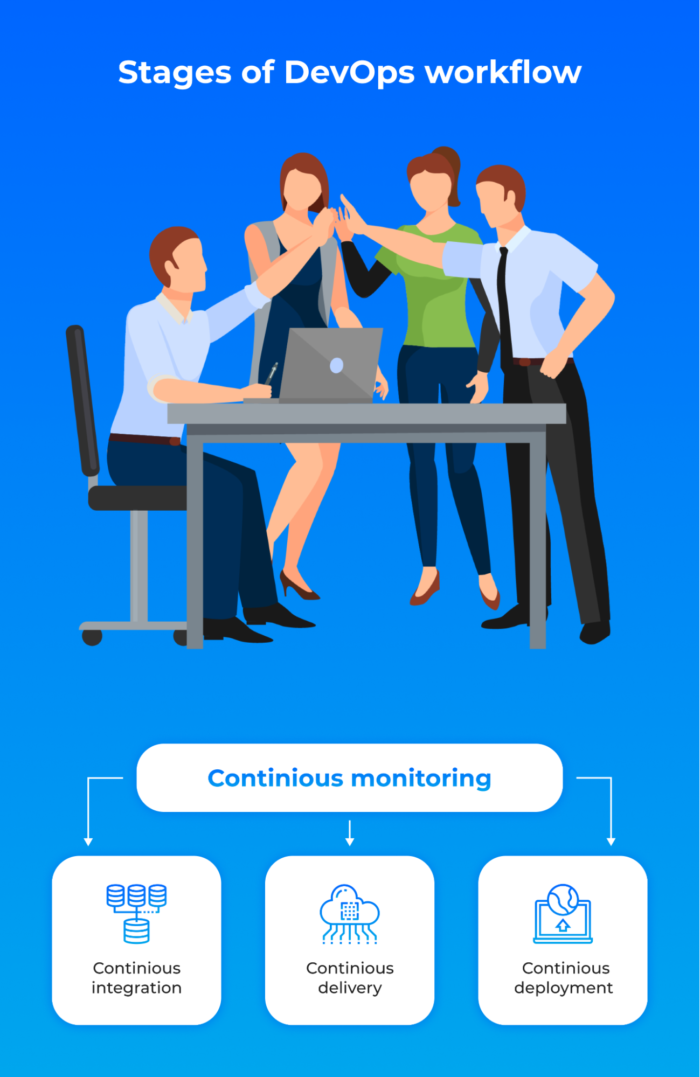The sooner you release your unique idea to the public, the higher the chance that it will receive the lion’s share of the audience’s attention. Delays in development can lead competitors to release their products before you. We recommend using DevOps practices to avoid this scenario.
However, what if you are a small company or simply don’t have time to find and hire DevOps specialists? Outsourcing of these services will come to your aid. And in this article, we’ll take a closer look at what DevOps is and how to properly outsource these practices. So, without further ado, let’s get started.
What DevOps Actually Is?
First, it should be said that DevOps is a set of different practices, the main task of which is to ensure continuous integration into production. At its core, DevOps is a bridge between developers and the IT operations team. These experts ensure the seamless migration of code from developer to production.
However, why do you need DevOps? This question will be answered by the main benefits that this set of practices provides to various businesses and startups:
- Improved product delivery speed
- Flexibility when working with various services
- Improved security
- Automation of internal processes
How Does DevOps Services Look Like?
When it comes to the DevOps pipeline, these operations are always meant:
- Integration
- Delivery
- Deployment
- Monitoring
It is worth talking about them in more detail so that you have a complete picture of what is hidden under the DevOps services.
Integration
The first major part of the DevOps pipeline is integration, which involves consolidating the entire codebase into one repository. Each new piece of code that needs to be added is automatically tested.
This approach allows developers to view and edit the code at any time. In addition, it greatly speeds up product development, as multiple developers can work on the product code at the same time.
Delivery
This stage of the process marks the automatic assembly and testing of new builds of the software product. The main task of this approach is to speed up the release of updates and improve their quality (namely, the elimination of critical errors and bugs).
Deployment
At its core, this is an automated version of the past process, and each change automatically appears in the production. The whole process changes by 180 degrees, and instead of large and planned updates, smaller ones are released and many times more often without any specific schedule. This allows you to get the necessary feedback from users many times faster and make changes based on it.
Monitoring
Monitoring and analyzing the information received is the key to creating successful software products. And DevOps practices include such an approach that allows you to automate most of the monitoring and speed up the receipt of feedback on the status of a software product.
This complex system allows you to quickly respond to emerging problems and transfer the necessary information to the developers who are engaged in solving them.
DevOps As a Service: What it’s All About?
Professional DevOps engineers are highly paid specialists who can customize internal processes to perfection. However, for such experience, you have to pay a lot of money and not all companies can afford their own staff of DevOps specialists. If we talk about startups, DevOps engineers are even more rare guests there. The only reasonable way out of this situation is to outsource DevOps tasks. However, how does this happen?
In short, you rent engineers for a certain period of time who implement DevOps methodologies for the realities of a specific business and client requirements. In addition, it is possible to transfer business infrastructure to cloud rails. In addition to the above, DevOps As a Service includes:
- Restoring internal pipelines after failures
- Cloud technology adoption
- Dockerizing and app-building
- Pipeline automation
All these are general services that can be obtained, but this does not mean that they will all be useful in your particular case. You will communicate with a vendor who will analyze your business and provide the ultimate solution to your problems using DevOps processes.
Why Outsourcing DevOps Services of Your Business?
DevOps outsourcing is a responsible step, and many businesses question whether the game is worth the candle. In order to help you with your future choice, we decided to collect the main benefits of outsourcing these methodologies.
Benefit #1. Wide Pool of Talents to Choose From
When hiring DevOps, you will be surprised at how expensive it is for the budget, and the more years of experience a specialist has, the more significant his paycheck will be. In addition, you will compete with other companies that can entice such a specialist with more favorable conditions. When you apply to an outsourcing vendor, you do not need to worry about hiring since such companies are already hired by specialists of different levels whom they are ready to provide you. In addition, you can choose specialists with the skills that your project needs.
Benefit #2. Faster Product Delivery
Outsource vendors are staffed not only with qualified personnel but also with the latest technologies that they can introduce into your business to improve internal processes and delivery of digital products. This way, you will always have a competitive edge thanks to more modern processes.
Benefit #3. No Risks
By contacting an outsourcing company, you free yourself from financial risks since you do not need to purchase equipment, software licenses, rent an office and a workplace for a DevOps specialist. You outsource the entire service to an outsourcing company while you can focus on other aspects of the business.
The Cost of Outsourcing
This question worries many who are going to outsource DevOps processes. And here, it is difficult to give an exact answer that will indicate the final price since there are too many variables (the complexity of the project, the number of specialists hired, and much more). However, you can understand the approximate cost of outsourcing by knowing the hourly rate in popular regions:
- North America: from $100 to $150 per hour
- Australia: from $100 to $150 per hour
- Western Europe: from $100 to $150 per hour
- Asia: from $49 to $100 per hour
- Eastern Europe: from $25 to $50 per hour
- India: from $25 per hour
It is on such prices per hour that you can count on if you contact a company from the relevant region for help. You will find out the final price of services only after the vendor analyzes your business and the upcoming scope of work.
Wrapping Up
As you can see, outsourcing DevOps processes is an extremely useful approach if you want to improve internal processes, migrate them to the cloud, or upgrade the delivery of future digital products. All you need is to contact a company that suits your criteria and conclude a cooperation contract.
By Yuliya Melnik

Yuliya Melnik is a technical writer at Cleveroad. It is a web and mobile app development company in Ukraine. She is passionate about innovative technologies that make the world a better place and loves creating content that evokes vivid emotions.



